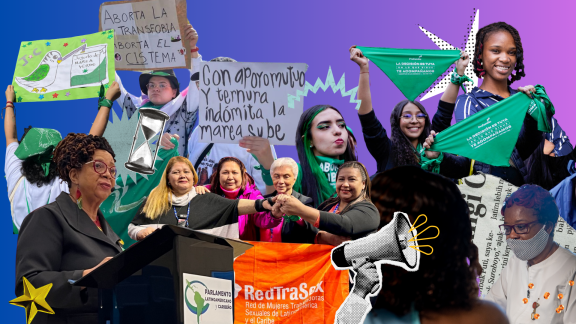Latin America and the Caribbean is one of the regions where women and girls continue to be disproportionately left behind. The latest data from ECLAC, in their review of the Beijing Declaration and Platform for Action, reveal a bleak reality: by 2030, an estimated 20 million women and girls in the region will be living in extreme poverty. But economic hardship is just one layer of a complex web of systemic inequalities that continue to deny women their rights, safety, and dignity.
Women in Latin America and the Caribbean bear an unequal burden of unpaid care work, a structural challenge that perpetuates gender inequality and limits their economic autonomy. Shockingly, one in four women in the region has no income of her own, making financial independence an unattainable goal for many. This economic disparity intersects with a lack of access to health care, as the adolescent reproduction rate remains high, disproportionately affecting the poorest communities. In some countries, more than 35% of young women in the lowest income quintile have had a child during adolescence, perpetuating cycles of poverty and limited opportunities.
The failure to address systemic barriers to health care has had deadly consequences, and they will continue to happen if we do not act. Unlike other regions of the world where maternal mortality rates have improved, Latin America and the Caribbean have seen no such progress. Childbirth and postpartum complications remain among the top three causes of death for adolescent girls aged 15-19. Meanwhile, gender-based violence remains an urgent crisis, with a woman in the region dying a violent death every two hours. According to the report Femicidal violence in figures in Latin America and the Caribbean by ECLAC, national surveys indicate that between 63% and 76% of women and girls have experienced gender-based violence in their lifetime. It’s a harrowing reality that underscores the urgent need for change.
These statistics are unacceptable in a region where governments have signed commitments to gender equality and the eradication of violence against women, such as ECLAC’s Montevideo Consensus on Population and Development. Strategies, of which the Organization of American States’ Follow-up Mechanism to the Belém do Pará Convention (MESECVI) is an example, and regional agreements exist, yet the political will and tangible responses remain insufficient. The inaction of states is a form of structural violence, one that feminist movements and women’s organizations have long resisted.
For decades, social movements, collectives and non-profit organizations have filled the gaps left by government negligence, providing safe and inclusive health services, advocating for legislative change, and accompanying survivors of violence. IPPF Member Associations in 30 countries across the region continue this essential work, ensuring that no woman or girl is left without support.
Next week, we are actively engaging in the Commission on the Status of Women (CSW), where it is of utmost importance that governments and stakeholders listen to what we have to say. They must amplify our voices and back our needs at the negotiating table. This is a matter of life and death: we cannot survive unless we prioritize addressing violence, climate change and poverty from a gender standpoint. We call on you: our lives are at stake.
At IPPF, we are unwavering in our commitment to prioritizing women, girls, and vulnerable populations in all their diversity. We will continue to fight for their rights, no matter how long it takes. However, we cannot do it alone. Governments, multilateral agencies, and civil society must come together to take decisive action. The time for empty promises has passed—it is time for urgent, meaningful change.
when
region
Americas & the Caribbean
Subject
Gender equality

This is a matter of life and death: we cannot survive unless we prioritize addressing violence, climate change and poverty from a gender standpoint. We call on you: our lives are at stake.












